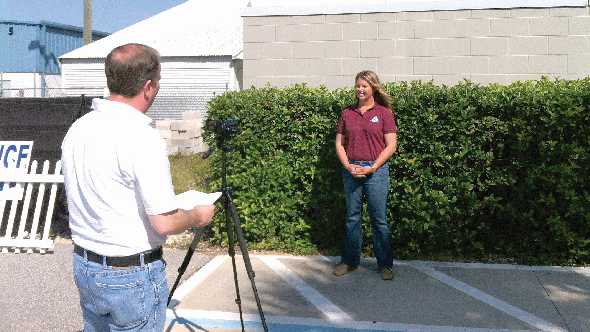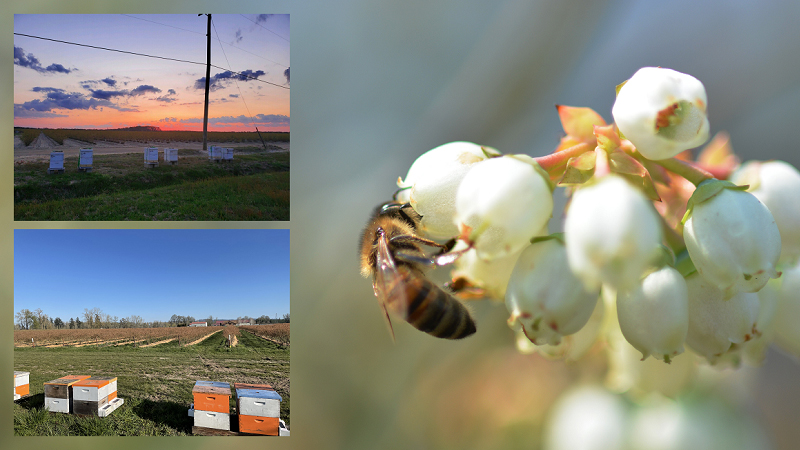Growers Need To Be Mindful When Dealing With The Media
Dealing with the media can be intimidating, especially for younger people assuming roles of leadership in their respective fields. Good preparation and understanding the ground rules, however can go a long way toward removing the fear factor from a media interview.
 Deron Johnson, senior vice president of consulting for the marketing and communications firm FLM+, has more than 25 years of experience in agricultural marketing and has provided media training to many of his clients over the years. He says young growers should engage with the public and be open to media inquiries.
Deron Johnson, senior vice president of consulting for the marketing and communications firm FLM+, has more than 25 years of experience in agricultural marketing and has provided media training to many of his clients over the years. He says young growers should engage with the public and be open to media inquiries.
“It is critical because the media plays such a crucial role in the dissemination of information,” Johnson says. “Growers are missing opportunities to help shape the story and help others understand what’s happening in agriculture if they don’t engage.”
Be A Prepper
Johnson says preparation in advance of a media interview is the foundation for success. Give some consideration to the messages you want to communicate to the reporter.
“The idea of going into an interview and winging it is not a recommended approach,” he says. “Think ahead of time about some anecdotes and data points you can bring to the conversation to give your message life and credibility.”
Johnson also suggests being ready for the hard questions. “Don’t just hope the tough questions won’t come,” he says. “So, think about how you would answer the questions you’d rather not answer. It is not about being evasive; it is about taking an active role in shaping the interview to get your point of view across.
“Another important tip is to have a very clear understanding going into the interview about what the reporter wants to find out from you, what the story angle is, and what the deadlines are,” Johnson says. “These all are items to talk about to establish the ground rules before going into the interview.”
Johnson adds understanding the reporter’s motivation in advance helps you better prepare for the interview and anticipate the information the reporter is seeking to create the story.
Big No-Nos
Johnson cautions there really is no such thing as “off-the-record” when conducting an interview. Anything communicated during the course of the interview should be considered fair game.
“I would add a caveat to this rule,” he says. “If you don’t want it reported, don’t say it. However, if you have a good relationship with a reporter you have worked with before and trust, you might be more comfortable sharing off-the-record information for the reporter’s background and context.”
How many times have you seen television interviews where the subject says “no comment?” Of those times, how often does it seem like the person being interviewed has something to hide? Johnson says that is most often the perception whether it is a print, radio, or television interview.
“We urge people to avoid saying, ‘No comment,’ because it comes off as being evasive, not helpful to the reporter, and like you are trying to hide something,” he says. “It gets back to an earlier point, prepare for the tough questions in advance.
“Rather than saying, ‘No comment,’ say, ‘I really can’t speak to that, but here are things I can talk about.’ Then bring it back to the messages you want to communicate. If the question keeps coming back up, you can politely inform the reporter you can’t share the information because it is confidential or that you don’t have the expertise to answer. Then it is good to recommend someone that can provide the information.”
Shake The Nerves
There’s nothing to be ashamed of if you are nervous the first few times you are interviewed. Not to sound like a broken record, but Johnson says preparation in advance of the interview is the best way to shake the nervousness.
“Preparation builds confidence,” Johnson says. “If you go into the interview knowing what your key messages are, it helps take away the unknowns. It is the unknowns that can make you nervous.
“If the reporter asks a question that catches you off guard or you don’t understand, ask him to repeat the question,” he says. “This will give you an extra moment to think about your response. If you are really nervous, just take a few deep breaths and remind yourself that you are prepared. After all, they are coming to interview you because you are the expert in your field.
“And there’s one other benefit to relaxing,” he says. “When you are nervous, you tend to talk faster and keep talking to fill up the dead air. In that case, you might say something you really didn’t want to say. Remember, it is OK to stop talking.”

Photo by Paul Rusnak
TV And Radio
In a print interview where you might have several minutes to answer a question, television and radio seeks the 30-second sound bite to tell the story.
“In preparing for television or radio interviews, go ahead and script out those quick sound bites,” Johnson says. “Think about shorter and crisper quotes for these mediums.”
Make sure your message is the only thing the viewer or listener is focusing on. Take steps to eliminate potential distractions from your message.
“Try to avoid verbal ticks like — ‘uh’ — especially in radio where it can be really annoying for the listener,” he says. “In prepping for a television interview, talk to the reporter about what your backdrop is going to be. Is it going to be in the field? Is it going to a be at trade show? And, think about what you are going to wear. A hat may throw hard shadows if you are outside, so the cameraman may ask you to remove it. Wear a solid-color shirt and avoid busy patterns that might be distracting.
“In general, present and conduct yourself in a professional manner. That really applies to all mediums.”
Mainstream Vs. Ag Trade Media
“There are a couple of big differences between what I’d call consumer media and ag media,” Johnson says. “The ag media we would consider to be more ‘friendly’ in that they have a vested interest in the success of agriculture.
“General consumer media don’t have the same sense of advocacy and may not care if the grower succeeds or fails. They are just trying to get a story. This is where preparation and fully understanding the ground rules and the motivation of the reporter becomes even more critical.
“Don’t assume the reporter is knowledgeable about agriculture. Help educate them and avoid farm jargon and acronyms they probably won’t understand.”
Can I Get A Re-Do?
So, what do you do if you feel you really flubbed your interview?
“Once the interview is done, you can’t really bring it back,” Johnson says. “If you really feel like you messed up after the interview is over, instead of sitting back and hoping they don’t use those parts, call the reporter back and ask if you can restate the quotes in question. Most of the time, the reporter will be willing to work with you given their deadline allows it.”
GenNext Media Tips And Tactics
We asked a couple GenNexters who have experience with the media for some tips to help out the next time you’re interviewed.
 Luke Hallman, Riverside Produce Farm
Luke Hallman, Riverside Produce Farm
Nanjemoy, MD
“Although you want to be as transparent as possible, your candidness could open yourself up to bad publicity. I made the mistake of revealing some production practices, such as pesticide applications and fertilizer use that may have impacted me. I would just be a little more reserved in discussing conventional production practices dealing with any sort of chemicals that can have a negative connotation.
I would focus on what you’re doing different than other farms — what sets you apart. I also would keep it simple so people can relate to you.”
 Justin Sorrells, Sorrells Citrus and DeSoto Fruit & Harvesting
Justin Sorrells, Sorrells Citrus and DeSoto Fruit & Harvesting
Arcadia, FL
“Everyone is a little different. If the camera is present, I like to pretend it is not there and simply speak directly to the reporter. But, one thing is a constant no matter the type of media — always try to be prepared. I always ask for a sampling of questions they will be asking, so I can be prepared with a response. Try to have an idea of what you are going to say and how you will respond to any given question. It goes back to knowing the subject matter you are being interviewed about. And, it is always OK to say, ‘I don’t know.’ It is better to admit you don’t know something than try to make something up or fake it.”









